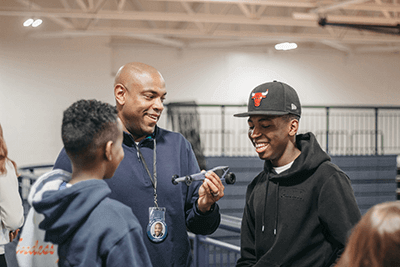April 28, 2022
 from Dr. Bill Hudson, Head of School
from Dr. Bill Hudson, Head of School
It has been a hectic several weeks for members of the MPA community! We had a wildly successful Spring Auction with more than 250 parents, alumni parents, alumni, grandparents, faculty, and staff gathered at A’Bulae in St. Paul to celebrate MPA and raise much-needed funds for our students. It was a full house, and everyone seemed to have fun and were undoubtedly happy to be together again.
Yesterday, we hosted Grandparents and Special Friends Day with several hundred attending for Lower, Middle, and Upper School students. For some, it was their first time in the school and the first time experiencing a little bit of the magic that happens each day at MPA. In my opening remarks to the grandparents and special friends, I shared research highlighting the importance of grandparents and mentors/role models to young people’s academic, social, and emotional health and well-being.
The importance of a strong sense of community to the growth and well-being of young people cannot be understated even more so as we emerge from the pandemic. Belonging is an essential human need, and we all require and long for caring, genuine, and ongoing connections with others. In a school environment, students deeply desire to be accepted, respected, included, and supported by others in the school social environment.
A recent article in the New York Times caught my attention and presented evidence that all educators and parents feel instinctively. While I have been concerned about student mental health for some time now, and MPA has made it a priority to address, the article powerfully but sadly presented the current reality of our young people in a post-pandemic society.
There is some good news. In many instances, young people are avoiding high risk behaviors. “Young people are more educated; less likely to get pregnant; use drugs; less likely to die of accident or injury,” said Candice Odgers, a psychologist at the University of California, Irvine. “By many markers, kids are doing fantastic and thriving. But there are these significant trends in anxiety, depression, and suicide that stop us in our tracks.” For example, emergency room visits for suicide attempts rose 51 percent for adolescent girls in early 2021 compared to the same period in 2019. The figure rose four percent for boys.
This winter, Middle and Upper school students participated in a survey asking them to share their stressors, anxiety, and ways to address their mental health. The results are encouraging. For example, Upper School students overwhelmingly agree that teachers are available to help them, answer their questions, and talk about their concerns. Nearly every student agreed that at least one adult in the school cares deeply about them and their success. Almost 80% of Middle School students agree that their teachers care about them and are there for them when they need help. A vast majority feel like they fit in, belong, and are happy to be at MPA. An even greater majority report feeling safe at school.
The more we as parents know, the better we are at anticipating, recognizing, and helping our children. I was pleased with the participation at last week’s Middle School parent education presentation and conversation on the middle school years. In partnership with Lamar Shingles, director of equity and belonging, our wonderful Parents Association has offered several parent education programs this spring. One is scheduled next Monday to support LGBTQ students.
Addressing MPA students’ social, emotional, and mental health happens each day, in small and big ways, both obvious and less noticeable. As the recent student survey found, the role of teachers and trusted adults at MPA cannot be understated. Programs like CHAMP and advisory in Middle and Upper School interweave social and emotional learning. All new students and students in ninth and eleventh grades participate in annual suicide awareness education and screening. We openly address mental health and resources available to students in ninth-grade health and eleventh-grade wellness classes. Counselors are also a part of our ninth-grade seminar class.
Belonging affects a variety of social, emotional, and academic variables. It nurtures self-esteem and self-confidence, leads to higher academic achievement, fosters resiliency, and helps build positive peer relationships. In an uncertain and rapidly changing world, community and belonging provide an anchor for our young people. We need one another. The Spring Auction and Grandparents and Special Friends Day are evidence of what can be when we join together in partnership.
Recognize The Signs Of Anxiety And Depression
- Approach with sensitivity: Be direct, but with compassion and understanding.
- Offer health ways to manage emotions: Exercise, meditation, and journaling.
- Get the correct diagnosis: Be critical consumers by doing your research and finding the right doctor.
- Carefully consider medications: Partner with physicians by being well-versed in options available.
- Don’t forget the basics: Sleep and physical activity are essential.